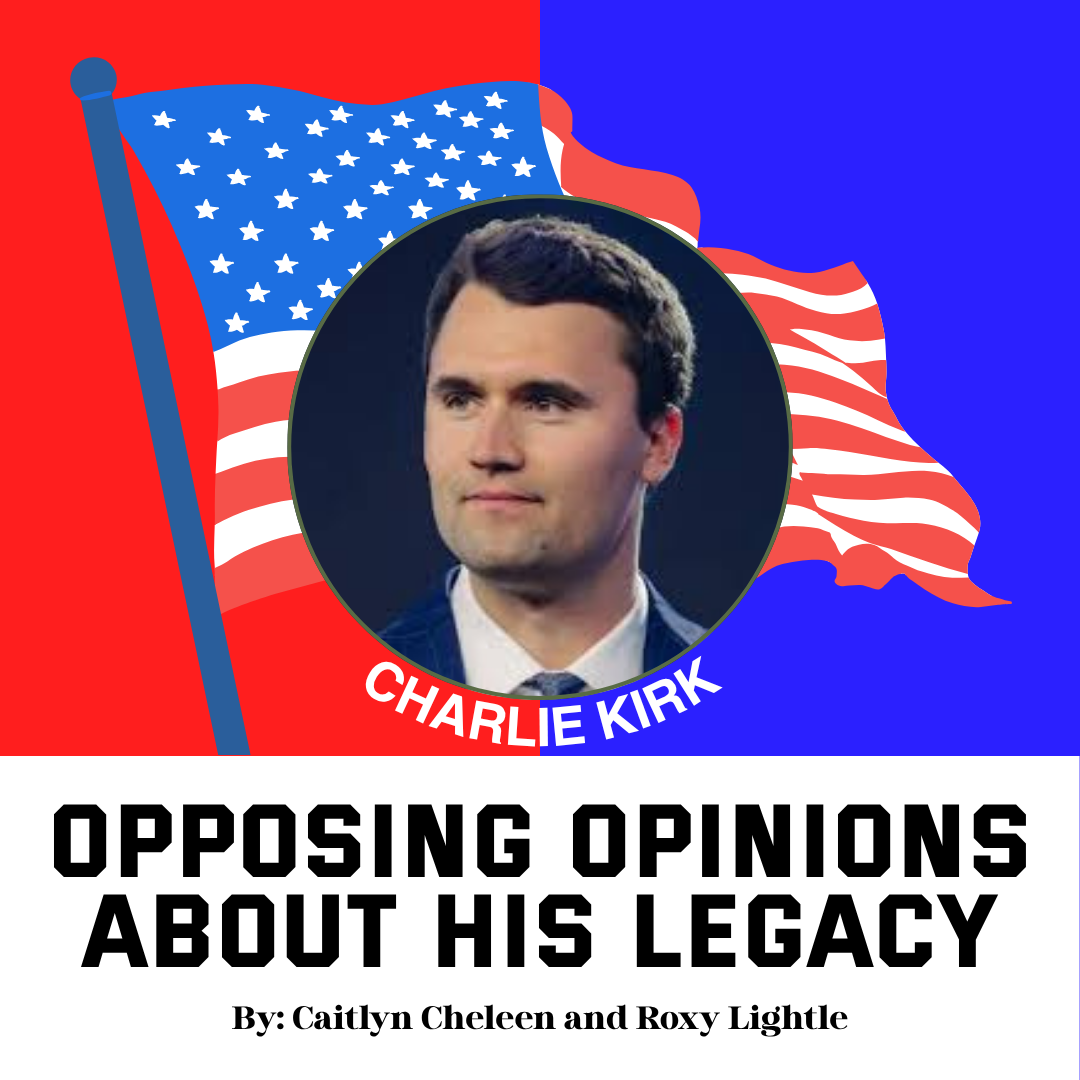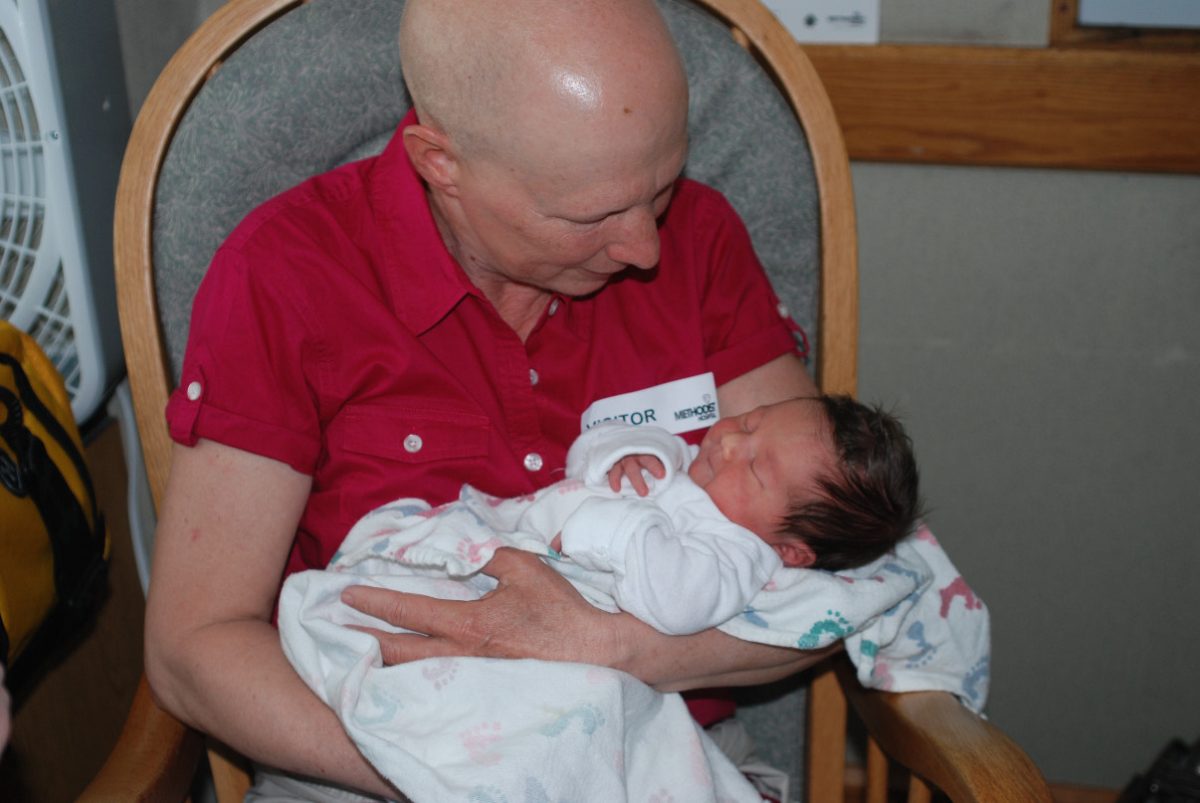Editor’s note: This dialogue on the death, aftermath and legacy of conservative political activist Charlie Kirk comes from two differing perspectives – one more liberal, one more conservative. What follows below is a discussion meant to be thoughtful that covers several topic areas that have come up since Sept. 10. Both perspectives completely agree that there is no place for political violence.
An Overview
Roxy Lightle: In America, the freedom of speech is a protected right, existing to preserve diverse perspectives, encourage debate and protect individuals from interference or censorship based on their beliefs. Charlie Kirk, a conservative activist and political podcaster, did not deserve to be killed. Gun violence has no place in civil society, especially not in schools, communities or anywhere in the nation. However, the widespread idolization of Charlie Kirk as a martyr in the wake of his death calls for critical reflection on his legacy and the harm his debates may have caused.
Caitlyn Cheleen: Charlie Kirk was a very influential person in so many lives, spreading his views and speaking at college campuses. He brought conversation in politics back, especially throughout the younger generation. No one should be killed simply because of their differences in political views. We need to recognize that Kirk’s death is in no way justified and as a society we need to do better. We are slowly heading towards self destruction if we can’t acknowledge other people’s views and beliefs.
Character
CC: Charlie Kirk was a family man who was very open about his Christian beliefs. He valued the truth and didn’t sugarcoat problems currently happening in our country. He even started an organization called Turning Point USA which helps to bring students education and training on freedom and government. I think that is what made him so influential. Instead of deflecting, like most politicians do, he spoke clearly and got straight to the point in his debates so that people clearly understood his point. He was polite, encouraging everyone no matter their race, gender or belief system to step up to the microphone and state their opinions.
RL: Charlie Kirk was known for his quick, controversial takes and unapologetic conservatism. Despite identifying as a devout Christian, many of his comments contrasted with biblical teachings that discuss compassion, unity and inclusion. For instance, while Galatians 3:28 states “there is neither Jew nor Greek…for you are all one in Christ Jesus . . .”. Kirk repeatedly made comments that marginalized groups based on their ethnicity, sexuality and gender identity. His dismissal of empathy as a “made-up, new age term” reveals an opinion grounded more in outdated separation than moral compassion. While he had the constitutional right to express these views, consumers need to recognize that others – especially those who are marginalized – often face violence or threats of erasure for that same right. The imbalance of how the nation responds to unusual expressions of free speech should not be ignored.
Violence
RL: Kirk’s violent and unfortunate death has sparked disputable responses that ranged from celebration of the act to loyal glorification of his legacy. Despite the expectation that no person should be harmed for their beliefs, some reactions from his supporters have only continued the same hostility Kirk embodied. Viral footage of individuals harassing service workers by taking Charlie’s name reveals how their “mourning” has turned into intimidation. Kirk’s past public statements include defending extreme anti-abortion views and claiming that all trans people are pedophiles. He and the media labeled such views as “political,” which abolishes the real impact of his rhetoric on those targeted by it.
CC: Charlie Kirk was influential on many platforms, expressing his ideology and belief system. He reached many people, bringing conversation and debate to many college campuses. While he did advocate for the Second Amendment (the right to bear arms) he did not condone violence. The fact that his death is being celebrated across so many platforms is disturbing and jarring to see how desensitized people have become. I think that social media plays a huge part in growing the violence which highlights and exaggerates the differences between political parties. Taking clips out of context without showing the entire conversation is a huge part in how misinformation spreads. One example of this is when Kirk said “If I see a Black pilot, I’m going to be like, ‘Boy, I hope he’s qualified.’” If this quote is by itself, it does sound racist. But in this instance, he was talking about DEI programs hiring pilots to meet a diversity quota instead of qualifications.
Language
CC: Kirk said, “When people stop talking, really bad stuff starts.” All Kirk did was bring debate to college campuses to question, and educate the next generation of voters. He was assertive when debating and confident in his beliefs and ideas. Instead of being applauded for his efforts, he was called a Nazi and vilified because of his beliefs. I believe that all this hate speech about what kind of person Charlie Kirk, very much led to his death. Are conservatives being targeted? Am I allowed to express my ideas?
RL: Kirk’s debate style was confrontational and often eccentric. Footage from his many platforms – ranging from TikTok to televised debates – he adopted language many consider racist, misogynistic and xenophobic. He spoke openly against gun control laws and praised unrestricted access to firearms, a weapon that led to his own death. Though outlandish, Kirk’s words were not without impact. Quoting biblical punishments for LGBTQ+ individuals and calling civil rights leaders “bad guys” shaped a perspective that many of his loyal supporters adopted and many others feared. The statements he made weren’t just controversial; they were damaging.
Future
RL: Kirk’s death should serve as a moment of reflection and not revision. The nation faces a decision whether to believe in the spread of his outrageous narratives or strive towards diversity. Elevating Kirk as a symbol of free speech risks overlooking the outcome of his false doctrine, which often fueled distrust, alienation and hatred. The term “Nazi” isn’t an outlandish label in the slightest at all for Kirk. He has claimed that democracy is “not an American value” and that immigrants degrade the national legacy, which reflects a deeper resistance to diversity. If such ideas are coerced without regulation, they could continue to separate an already exclusionary country. Recognizing the danger of such ideologies isn’t about silencing opposing political views, but preserving the truth, inclusivity and justice.
CC: I see this getting worse especially with the internet. Currently, we are living in a country where we think violence solves all of our problems. Charlie Kirk wasn’t even a political leader in our country, and yet he was shot and killed for his views. He was shot and killed on a college campus by an assassin without remorse. Instead of someone seeing a father of two and a husband, they saw an enemy. That kind of loss of sympathy is what is tearing our society apart. We are going deeper and deeper into a violent spiral that will only lead to worse things. Even on social media people are laughing and celebrating his death. No remorse that he was a human being. We need to reevaluate our values as a country or situations like these are only going to escalate. Charlie Kirk as someone who and that is exactly how we should remember him and not as a martyr.
Conclusion
CC: While I believe that Kirk shouldn’t be worshiped, I think he definitely deserves attention and remembrance because of his impact. Just because Charlie was killed to be silenced, doesn’t mean that his message has to be. He taught us that sitting down and having one on one conversations has a major impact. That is exactly what needs to happen, we might not completely agree with everything someone has to say, but at least we can be open minded to other views.
RL: Charlie Kirk shouldn’t have been killed for his beliefs because violence is never a justifiable response to speech. But in death, as in life, it is critical to recognize his negative impact on the future growth of the nation. Kirk’s legacy should not be rewritten as martyrdom without recognizing the harm his words caused. His death was a tragedy– but it is not a canonization.









